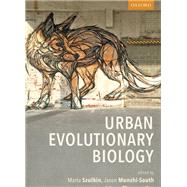Urban Evolutionary Biology fills an important knowledge gap on wild organismal evolution in the urban environment, whilst offering a novel exploration of the fast-growing new field of evolutionary research. The growing rate of urbanization and the maturation of urban study systems worldwide means interest in the urban environment as an agent of evolutionary change is rapidly increasing.
We are presently witnessing the emergence of a new field of research in evolutionary biology. Despite its rapid global expansion, the urban environment has until now been a largely neglected study site among evolutionary biologists. With its conspicuously altered ecological dynamics, it stands in stark contrast to the natural environments traditionally used as cornerstones for evolutionary ecology research.
Urbanization can offer a great range of new opportunities to test for rapid evolutionary processes as a consequence of human activity, both because of replicate contexts for hypothesis testing, but also because cities are characterized by an array of easily quantifiable environmental axes of variation and thus testable agents of selection. Thanks to a wide possible breadth of inference (in terms of taxa) that may be studied, and a great variety of analytical methods, urban evolution has the potential to stand at a fascinating multi-disciplinary crossroad, enriching the field of evolutionary biology with emergent yet incredibly potent new research themes where the urban habitat is key.
Urban Evolutionary Biology is an advanced textbook suitable for graduate level students as well as professional researchers studying the genetics, evolutionary biology, and ecology of urban environments. It is also highly relevant to urban ecologists and urban wildlife practitioners.








